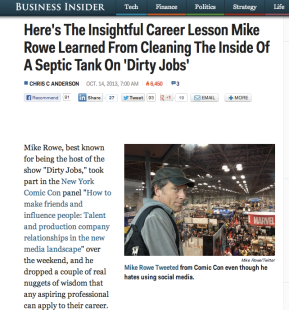
Mike Rowe is a television personality who is best known as the narrator for the Discovery channel’s Deadliest Catch and also hosted the series Dirty Jobs for 10 seasons. He’s on a one-man crusade to fight back against what he considers to be an unfair assault on hard work. His website, Profoundly Disconnected, explains it this way:
A trillion dollars in student loans. Record high unemployment. Three million good jobs that no one seems to want. The goal of Profoundly Disconnected is to challenge the absurd belief that a four-year degree is the only path to success. The Skills Gap is here, and if we don’t close it, it’ll swallow us all.
I’m personally a big fan of Mike and his message. He’s an incredibly well-read and articulate man, so it caught my eye when he wrote a missive on Facebook to object to a media assertion that he hates social media. He doesn’t. In fact, he uses it extremely effectively. What he doesn’t care for, however, is what he calls “the democratization of banality.”
As he so often does, Mike Rowe hits the nail on the head.
The Democratization of Banality

The Facebook post from Rowe was a response to this image on a Business Insider article which said that he “hates using social media.” This was a conclusion he surmised was drawn from some of his remarks at Comic Con International.
Now, it’s true – I may have said a few things at Comic-Con International that could be interpreted as … ambivalent. For instance, I might have suggested that the overwhelming amount of information shared via social media is “irrelevant to the vast majority of humans and completely unreliable in terms of verifiable fact.”
I might have also intoned that “most Facebook postings go unread by legions of fake friends who are nevertheless compelled to respond in some kind of Pavlovian reflex that affords us all the rare opportunity to ignore each other equally.”
I may have then muttered something about the “democratization of banality,” and pointed out that most people in most audiences – including the one I was addressing in New York – now observe the world around them on the screen of “some shiny little monument to planned obsolescence, instead of watching real people do real things in real time.”
The second I read the phrase “democratization of banality,” I knew I had to blog about it. It perfectly captures the root cause of so much resistance to using social media and its tendency to be ineffective. Social media doesn’t bore people. People do.
There are many clients who tell me they “hate social media” and point to the folks who tell us what they had for lunch and post picture of their pets on a daily basis. My response has always been, “Then you’re following the wrong people.” The definition of banal is “so lacking in originality as to be obvious and boring.” That, right there is the cardinal sin of social media. Thou shalt not be boring.
And so I say unto you, if your friends are boring then find new ones.
But if you are boring then be remarkable.
More Mike
In this TED talk, Mike tells some compelling (and horrifying) real-life job stories. Listen for his insights and observations about the nature of hard work, and how it’s been unjustifiably degraded in society today.
Top Marketing Stories of the Week
SEO Case Study: What a Difference WordPress Makes
Check out this case study to see how large an impact the back end technology of your website can have on organic search.
Why Visitor Analytics Aren’t Enough for Modern Marketers
If you’re looking for “one tool to rule them all,” you won’t find it. Online marketing is getting incredibly complex.
Don’t Insult Walmart On Twitter — Its New Corporate Policy Is To Politely Fight Back
Walmart’s new credo is “no free shots,” but up until about a year and a half ago, they took a passive approach to its critics on social media.